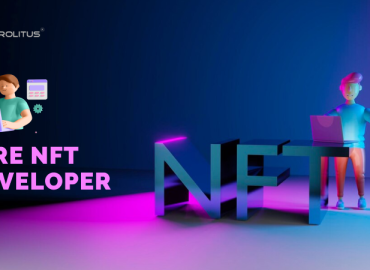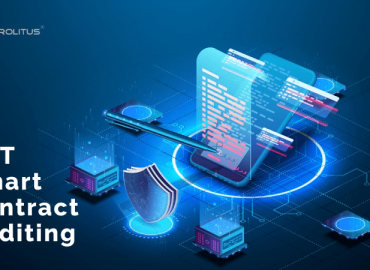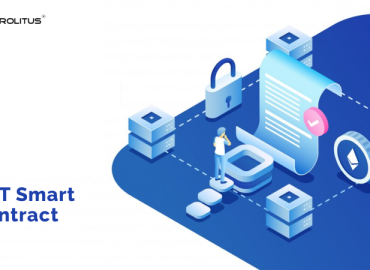The real estate industry needs to be faster to adopt new technologies, often relying on outdated practices and systems. This is due to many factors, including the high complexity and fragmentation of the industry, the need for regulatory compliance, and the large sums of money involved in real estate transactions.
The emergence of Non-Fungible Tokens, NFTs, and smart contracts, has significantly altered the real estate market. However, their adoption could have been faster due to a lack of understanding and education about these technologies and regulatory and legal barriers. NFTs are perfect for use in the digital ownership and trading of real estate since they are unique digital assets that cannot be duplicated. NFTs are giving the real estate sector a new degree of transparency, security, and ownership rights with Blockchain technology. With virtual reality-based virtual tours, virtual property ownership, and tokenizing physical assets, NFTs have huge potential in the real estate sector. This innovative technology is about to disrupt the traditional real estate market, creating new options for investors and property owners.
This blog analyzes how real estate NFTs are changing the industry and thoroughly explains the concept. Together focus on the various aspects of Real estate NFTs and their benefits to investors and developers. Also, what challenges and limitations are there in adopting them to scale the real estate industry?
How NFTs can represent real estate properties?
Non-fungible tokens (NFTs) have emerged as a new way to represent unique digital assets on a blockchain, and in the real estate industry, they can be used to represent real estate properties. However, a real estate asset must first be tokenized, which entails digitally representing the asset on a blockchain before it can be represented as an NFT. This can be done by breaking up the property into smaller units, which NFTs can represent. Each NFT represents a specific fraction of the property, such as 1% or 10%.
Once the property is tokenized, each NFT can be sold to investors who own a fraction of the property. In addition, the ownership of the property can be tracked on the blockchain, and each investor can hold their ownership in the form of an NFT. This allows investors to trade their ownership in the property, just like any other digital asset.
Overall, NFTs can provide a new way to represent real estate properties, making real estate investments more accessible, liquid, and transparent. While the use of NFTs to represent real estate properties is still in its early stages, their potential benefits are significant. They will likely lead to further exploration and implementation of NFTs in the real estate industry in the coming years.
Fractional ownership and its benefits for investors and developers
Fractional ownership is an increasingly popular concept in the real estate industry, where multiple investors collectively own a single asset, such as a property. This approach allows investors to buy a fraction of the property, providing greater accessibility to high-value assets that would otherwise be out of reach. Fractional ownership also provides greater liquidity, allowing investors to sell their shares more easily on the secondary market and share decision-making power with other owners, increasing transparency and accountability.
For developers, fractional ownership provides an opportunity to finance a project through a wider range of investors, reducing the risk of overleveraging or being reliant on a single source of financing. Developers can also involve investors in decision-making and provide regular updates, increasing investor trust and confidence in the project.
The rise of blockchain and NFTs makes fractional ownership even more accessible and transparent, providing new opportunities for investment and development in the real estate industry. Overall, fractional ownership benefits both investors and developers, and its popularity is likely to continue to grow in the coming years.
Real Estate Tokenization and how it can make transactions faster and more efficient
Tokenizing real estate in this way can provide several benefits. First, it can make real estate investments more accessible to a wider range of investors, as they can buy and sell fractions of a property rather than buying the entire property themselves. This can reduce the barrier to entry for real estate investment, making it more accessible to small investors.
Tokenizing real estate can also make buying and selling real estate assets easier, as NFTs can be traded on blockchain marketplaces. This can provide liquidity for real estate investments, making it easier for investors to buy and sell their property ownership.
Tokenizing real estate can also make managing and tracking property ownership easier. Ownership can be tracked on the blockchain, which is transparent and immutable, meaning that the property’s ownership history can be easily tracked and verified. This can reduce the risk of fraud and disputes, as property ownership is clear and indisputable.
Tokenizing real estate can also make raising funds for real estate projects easier. For example, developers can sell off fractions of a property to investors, raising funds for the development of the property. This can make it easier for developers to finance projects, as they can sell off portions of the property to investors rather than relying solely on traditional financing methods.
Property titles and how NFTs can make them more secure and easier to transfer ownership
The rise of blockchain and NFTs have made it possible to represent property titles as digital assets, offering greater security and efficiency in real estate transactions. Using NFTs to represent property titles, property owners can ensure greater security, as these digital assets are tamper-proof and can’t be duplicated or counterfeited. NFTs also simplify the transfer of ownership, as they can be transferred quickly and easily using blockchain technology, eliminating the need for intermediaries. Finally, NFTs allow for fractional ownership of real estate properties, enabling property owners to divide ownership into smaller units and making it easier for investors to purchase a stake in the property. This approach can increase accessibility and diversification for investors while making the transfer of ownership more efficient for all parties involved. Overall, NFTs offer significant benefits for property owners and investors, and their use will likely continue to grow in the real estate industry.
Potential Benefits of NFTs in Real Estate
NFTs (Non-Fungible Tokens) have the potential to offer several benefits in the real estate industry. Here are some of the potential benefits of NFTs in real estate:
Improved Efficiency: NFTs can streamline the real estate transaction process by reducing the need for intermediaries, such as real estate agents and title companies. Smart contracts, which can be encoded into NFTs, can automate various aspects of the transaction process, including title transfer, property ownership, and payment processing. This can reduce the time and costs associated with real estate transactions.
Increased Liquidity: Real estate investments are typically less liquid than other types of investments, as they often require significant capital and time to sell. NFTs can increase liquidity in the real estate market by enabling fractional ownership and secondary market trading of real estate assets. This can enable investors to buy and sell real estate assets more easily, potentially increasing demand and liquidity in the market.
Enhanced Transparency: NFTs can provide a transparent and secure way to manage property ownership and track investment returns. Using blockchain technology, NFTs can offer a tamper-proof record of property ownership, transaction history, and investment returns. This can reduce fraud and increase transparency in the real estate market.
Accessibility: NFTs can make real estate investment more accessible to a wider range of investors, including those with limited capital. Fractional ownership enabled by NFTs can enable investors to own a portion of a property, making real estate investment more affordable and accessible. This can potentially democratize the real estate market and enable more people to participate in real estate investments.
Increased Investment Opportunities: NFTs can create new investment opportunities in the real estate market, such as tokenized real estate funds, real estate development projects, and royalty agreements. These new investment opportunities can provide greater diversification and potentially higher returns than traditional real estate investments.
Reduced Costs: NFTs can reduce transaction costs associated with real estate transactions by eliminating the need for intermediaries and reducing the time and effort required to complete transactions. This can make real estate investment more affordable for investors and reduce property ownership and management costs.
Easier transfer of ownership: NFTs can make the transfer of ownership of real estate properties easier and more secure. Traditionally, the transfer of ownership of a real estate property requires a lot of paperwork, such as deeds, titles, and other legal documents. This process can be time-consuming and costly, often involving multiple intermediaries, such as real estate agents, title companies, and lawyers.
NFTs can streamline this process by creating a tamper-proof and transparent record of property ownership on the blockchain. Once a real estate property is tokenized into an NFT, the ownership of the NFT can be transferred between parties through a secure and transparent process that eliminates the need for intermediaries.
Smart contracts, which can be encoded into NFTs, can also automate various aspects of the transfer process, including payment processing and the transfer of ownership. For example, a smart contract can be programmed to release the payment for a property once the ownership of the NFT has been transferred to the buyer.
Additionally, using NFTs can potentially reduce the risk of fraud and errors in the transfer of ownership process. Since NFTs are created on the blockchain, the transaction history and ownership of the NFT are publicly visible and cannot be tampered with. This provides a transparent and secure way to manage property ownership and track the transfer of ownership.
Challenges and Limitations For Real Estate NFTs
While NFTs can potentially revolutionize the real estate industry, several challenges and limitations need to be addressed.
Legal and regulatory challenges: In many jurisdictions, the legal and regulatory landscape for NFTs in real estate still needs to be clarified. For example, it needs to be clarified NFTs will be treated under property law and whether they will be recognized as legitimate property ownership. Additionally, using NFTs for real estate transactions may require changes to existing regulations and laws.
Technical challenges: While the underlying blockchain technology is secure, the smart contracts used to encode NFTs can be vulnerable to bugs and other technical issues. This can lead to errors in the transfer of ownership process and potentially undermine the security of the NFT.
Limited adoption: Despite the potential benefits of NFTs in real estate, their adoption still needs to be improved. Many real estate professionals may need to become more familiar with blockchain technology and may be hesitant to adopt new technologies due to concerns about reliability, security, and cost.
High entry barriers: The process of tokenizing a property into an NFT can be complex and expensive. This can create high entry barriers for smaller real estate investors and developers who may need more resources or technical expertise to participate in NFT-based transactions.
Market volatility: The value of NFTs is highly volatile, creating uncertainty for investors and developers. This volatility can be especially problematic in the real estate industry, where property values are relatively stable.
Limited scalability: The current blockchain technology used for NFTs could be more scalable, which can limit the number of transactions that can be processed. This could slow the adoption of NFTs in the real estate industry, especially as the number of transactions increases.
Case Studies and Examples
There are already several examples of NFTs being used in real estate, although their adoption is still in its early stages. Here are some case studies and examples:
The first NFT real estate transaction: In 2019, real estate developer Evan Luthra bought a $12 million mansion in California and tokenized it into 12 digital tokens. Each token represented a 10% stake in the property, and investors could buy and sell these tokens on the blockchain. This was the first-ever NFT real estate transaction, demonstrating the potential of NFTs to fractionalize ownership of real estate properties.
RealT: RealT is a platform that allows investors to buy fractional ownership in real estate properties through NFTs. RealT uses smart contracts to automate various aspects of the transaction process, including the distribution of rental income to investors. The platform currently has properties in Detroit, Michigan, and is expanding to other markets.
Maecenas: Maecenas is a platform that allows investors to buy and sell fractional ownership in high-end art through NFTs. While not specifically focused on real estate, Maecenas demonstrates the potential of NFTs to fractionalize ownership of high-value assets.
Decentraland: Decentraland is a virtual world that uses NFTs to represent virtual real estate properties. Users can buy and sell virtual land on the platform and develop buildings and structures. While not directly related to physical real estate, Decentraland demonstrates the potential of NFTs to create new types of real estate assets in virtual worlds.
New York City condo sale: In March 2021, a luxury condo in New York City was sold as an NFT for $22.5 million. The NFT represented ownership of the condo and included access to various amenities, such as a gym and a pool. The sale demonstrated the potential of NFTs to streamline the real estate transaction process and eliminate intermediaries.
These examples demonstrate the potential of NFTs to transform the real estate industry by fractionalizing ownership, creating new types of assets, and streamlining the transaction process. However, the adoption of NFTs in real estate is still in its early stages. It remains to be seen how widely they will be adopted and how they will be integrated into existing real estate transaction processes.
Final Thoughts
In conclusion, NFTs can revolutionize the real estate industry by fractionalizing ownership, creating new investment opportunities, and streamlining the transaction process. The benefits of NFTs in real estate include the easier transfer of ownership, increased liquidity, and enhanced security and transparency. However, there are also challenges and limitations, including regulatory issues, technical challenges, and the need for widespread adoption.
The future outlook for NFTs in real estate is promising, as more investors, developers, and industry stakeholders are exploring the potential of NFTs to transform the industry. However, widespread adoption may still take some time as regulatory frameworks, and technical solutions continue to evolve.
As such, we call on investors, developers, and industry stakeholders to explore the potential of NFTs in real estate and collaborate to develop innovative solutions to the challenges and limitations of NFT adoption. By doing so, we can unlock the full potential of NFTs to revolutionize the real estate industry and create new opportunities for investors and developers alike.
Prolitus for Real Estate NFT Development
Prolitus offers various services, including blockchain development and NFT development, that can be applied to the real estate industry. Prolitus has expertise in building decentralized applications on blockchain platforms like Ethereum, Binance Smart Chain, and Polygon. In addition, we have experience developing NFT marketplaces, smart contracts, and other blockchain-based solutions.
We can apply our blockchain and NFT development expertise in the real estate industry to create innovative solutions that streamline the transaction process, enhance transparency and security, and create new investment opportunities.





